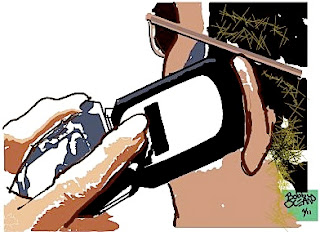I call today's Smart Phone the "transistor radio" of this generation. Even though, I know it's actually multi-generational.
Invented by an older, more experienced generation, the building blocks re-imagined and pushed forward by an incoming evolutionary generation, radio merges with the life that welcomes it from within each culture, like it always has, and emerges into this era's incarnations as an app embedded in our mobile device.
Last time it was nearly killed off - with the advent of television, close call! -- but radio hung on, then flourished, remember?
Like a drought-resistant, organic consciousness, it found a new HEARTBEAT in the primal groove of rock and roll. That four-beats-to-the-bar was the first beta OS for the newfangled ubiquitous crops of transistor radios kids were keen on. Those transistors replaced bulbs, and so were the 'grinchiest!' Now, transistor sisters and brothers of the first teen years, astonished at the power of being recognized as a group, were as mobile as their souped-up cars, and could take the powerful support, offered by their music, with them anywhere.
Then, as now, everything is in motion. Very quickly, in our retro perspective, came the next version of heartbeat. Then the next, and the next. Survival-101, Vampire Movie-101...
Rock and Roll One had revived radio for a new few generations. The newest, with a restlessness reminicent of existentialism-idealized, were already pushing the boundries of their previously comfortable nests.
The music industry noticed immediately. The newest raw beat was incorporated and reclassified.
The throbbing vital meter was smoothed over and presented as R&R_One-point-two. Bugs Fixed included: Bill Haley replaced by Elvis (that was a biggie); Patty Page, Kaye Starr and Doris Day, supplanted by newer versions called Connie, Frankie and Annette, you know, the Pat Boone covering Fats Domino pattern, that kind of thing...
More updates followed. Beatles Pop, with a tweak toward Chicago based blues, gave us Stones, who were, in turn, added to, tweaked and immitated. Borrowing from American algorhythms, already established as winners then repackaged as imported, British OS Models became as popular as Dylan changing music styles, and ever-present as cover-songs, with performer after songwriter, sampling the HTML, or DNA, or "inspiration" of their predesessors, then rendering their version.
Looking at the heartbeat, we see as well as hear a pattern, woven from countless recordings fueled by admiration and homage.
One such example might be the V-Morrison, S-Winwood and Clapton Music Modulator Models, all directly based on those of Ray Charles, Chuck Berry or Muddy Waters, just to start a much longer list. Even as these Tribute Heartbeats were extremely successful at recreating a sound and establishing a "new standard," it wasn't long before even they were typed as "old school" and being rewritten and updated by for many other generation's personal voices and choices.
In just a few decades, everything previous appears archaic. [Until explored by the following generation.] Like it always has.
Like the one using the very latest computer Operating System today, knows it was only yesterday she had installed the previous one that said the same thing, so that earlier collection of radio's strong minds, usually led by its strongest, banded together in the station's Programming arena, and did battle with like-minded tribes in other stations until they were "updated."
This competetive positioning led to a nation of copycat formats, each with a tight music playlist. Eventually, even the programmers left this tight, uncreative machinery and now the industry is over run by corporate poseurs (whose entertainment credentials consist of allowing their children to change the CD for them).
But audio online is entirely different. Listeners reveled in their internet's freedom from commercial broadcasting's kind of branding tyranny. Just as people have always celebrated freedom.
Today's connection is called "Wi-Fi," ; radio's first nickname was "Wireless." Yesterday's mobile played tunes. Today's let you play the tunes, plus has world-wide iternet connection, takes pictures and can even act as a DSP plug in for an electric guitar one moment and an audio mixer the next.
I wonder how long before they release an app that allows you to switch your cell phone to "Stun."
Because it is such an integral ingredient of this now unfurling generation of global voice, I call it their "transistor." But it's everyone's, in actuality. Mine, too. It has quite a few more bells and whistles than the transistor radios of only a few generationce whence, yet still, with memory enough to hold our favorite songs, can still accurately be referred to as "groovy."
--0--

No comments:
Post a Comment